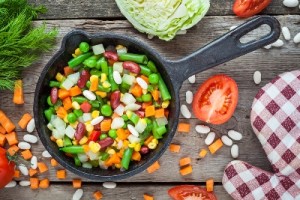 You probably know that eating healthy, whole foods is the best way to get the vitamins and minerals that your body needs.
You probably know that eating healthy, whole foods is the best way to get the vitamins and minerals that your body needs.
The shift back to food-focused nutrition is great because it benefits your health in so many ways that a vitamin cannot. However, there are some steps you can take to maximize the nutrition you get from food.
Plants With Meat
Have you heard about plant sterols? When they’re eaten in the forms of fruits and vegetables they can help reduce your LDL (bad) cholesterol and boost your HDL (good) cholesterol. When you eat vegetables with meat, the sterols actually help prevent the LDL cholesterol in meat from entering your blood stream.
This is one of the critical reasons why it is so important to eat vegetables with your meals. Additionally, the fat in meats helps your body digest and absorb the nutrients in vegetables and whole grains. It’s a win/win situation. Of course, you don’t have to eat meat to help your body digest many fat soluble vitamins found in vegetables. You can consume healthy oils like olive oil to facilitate the process.
Cook Your Veggies or Eat Them Raw
Did you know that some vegetables have more nutrients when they’re cooked? Others have more nutrients when they’re raw. You can maximize the nutrition by knowing when to cook them. Here’s a short list:
- Asparagus – Cooked
- Beets – Raw
- Broccoli – Raw
- Mushrooms – Cooked
- Peppers – Raw
- Spinach – Cooked
- Tomatoes – Cooked
- Sweet Potatoes – Cooked
- Cauliflower and Cabbage – Cooked
- Lettuce – Raw
- Garlic and Onions – Raw
- Squash – Cooked
- Cucumber – Raw
- Kale – Cooked
Add Vegetables, and Some Fruit, to Every Meal and Snack
If you’re not accustomed to eating a large amount of fruits and vegetables then you may notice digestive disturbances. The key is to start slowly and add a bit of vegetable to every meal and snack. Allow your body to get used to processing them. If, after a few weeks of increasing your vegetable consumption, you’re still having issues, try to determine what vegetables are causing the problems.
Also analyze what you’re eating them with. For example, if you’re eating cauliflower with a dinner roll, you may not be getting the fat your body needs to fully digest and absorb the nutrients. This malabsorption can cause stomach problems like gas, diarrhea, and bloating.
There are simple steps you can take to maximize your nutrition. Pay attention to the foods you eat and how you eat them. Consider combining your vegetables with healthy fats and prepare them in the most nutritionally optimal manner for the best results.


